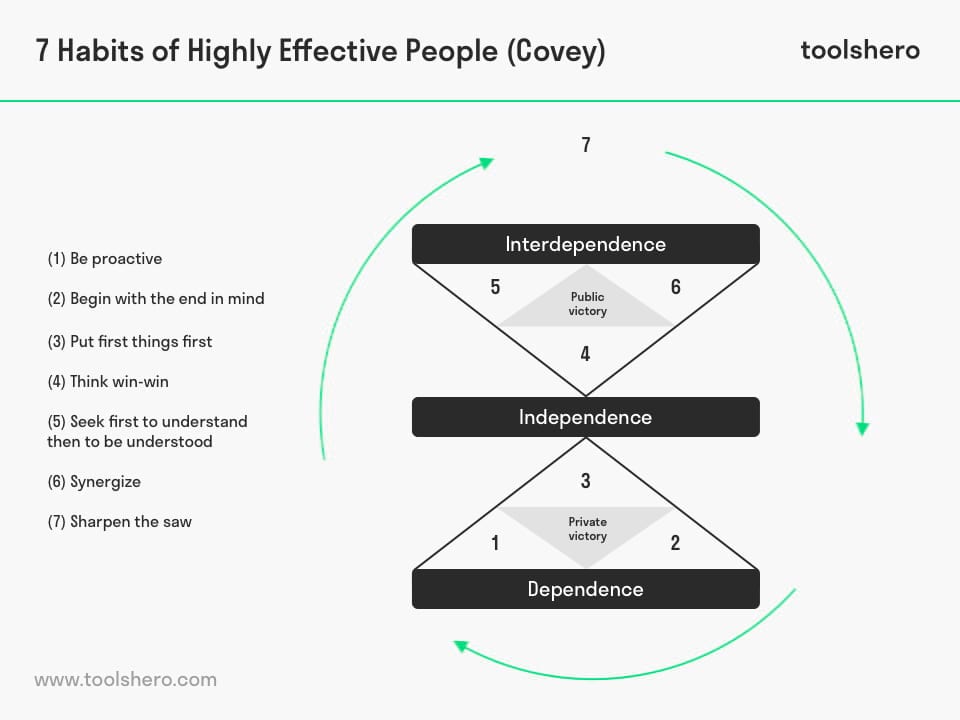7 Habits of Highly Effective People (Covey)

7 Habits of Highly Effective People: this article explains the 7 Habits of Highly Effective People, developed by Stephen Covey in a practical way. It gives a summary and overview of these habits, so you can put them into practice. After reading you will understand the basics of this personal development and time management tool. Enjoy reading!
What are the 7 Habits of Highly Effective People?
The Seven Habits of Effective Leadership is a book written by Stephen Covey. Covey presents a method in this book to become effective in achieving goals. Covey defines effectiveness as the balance between achieving goals and caring about how those goals are achieved. The book has sold more than 25 million copies worldwide.
The factors which, according to him, can be found in effective people, are summarized in 7 described qualities. These are:
- Be proactive
- Begin with the end in Mind
- Put first things first
- Think win-win
- Try to understand first before you want to be understood
- Work synergistically
- Keep the saw sharp
Background of 7 Habits of Highly Effective People
In his book The 7 Habits of Highly Effective People (1989), Stephen Covey describes how you can be happier and more effective in life. This book is the result of a long-term study into the principles of success. Until World War I (WW1) success from a fundamental attitude to life could be summarized in terms of for example modesty, integrity, moderation, loyalty, patience, etcetera.
After WWI success was defined by a more pragmatic attitude to life. Success is especially measured by personal performance, skills and status. Stephen Covey argues that lasting success is only possible if you live according to a number of fundamental principles. He summarized these principles of success in the 7 Habits of Highly Effective People.
7 Habits of Highly Effective People explained: theory and summary
How do you give direction to your life in a constructive and effective way? The book The 7 Habits of Highly Effective People (1989), provides an answer to this central question, based on 7 Habits of Highly Effective People. Stephen Covey expresses the ‘action plan‘ in the following structured model of development.

Figure 1- The 7 Habits of Highly Effective People (Covey)
1. Be proactive
Habit 1 be proactive has a lot to do with a person’s “circle of influence”. What you can control, what you can influence and what is out of your reach. Pro activity is strongly related to acknowledging your own responsibility and influence.
The first big step that has to be taken is the step from dependence to independence. Here you will begin to determine your own life by using your own agenda. You are aware of the fact that you are the architect of your own life (habit 1 of the seven habits of highly effective people) and with this knowledge you set to work.
Pro-activity is the first characteristic of effective leadership according to Covey. And with good reason. The most fundamental characteristic of a successful and effective person is pro-activity. It is crucial not to blame others, or circumstances, for things that go wrong, in Covey’s view.
When there is a problem, proactive people will focus on things they can change, whereas reactive people focus on aspects they have no control over. They tend to attract negative energy by blaming external factors or other people. Reactive people play the victim sooner than proactive people would.
2. Begin with the end in mind
This is the habit of vision, SMART Goals, and mission. Beginning with the end in mind means that when you make decisions today you consistently take into consideration what you stand for ‘in general’. Habit 2 has to do with the principles and guidelines you choose to live by. You determine what you find important in life, what you stand for, what you want to accomplish.
In his book, Covey asks the reader to imagine their own funeral with this characteristic in mind. He asks the familiar question: how would you like other people to remember you?
By thinking about such questions, and about what can make a difference in your life, important values can be identified. These values should reflect one’s own behaviour in life. The essence of this second characteristic is to remove all the things in life that keep someone away from what is truly important.
3. Put first things first
Habit 3 put first things first is an important habit. This habit has to do with integrity, discipline, sticking to your agreements. What is life about, and how do you wish to shape your own life? Knowing this, you will get to work pro-actively while setting the right priorities.
The second big step is that of independence to (self-selected) interdependence. Covey once more asks a number of questions in connection with this characteristic:
- What can you do to improve your personal life?
- What can you do to improve your professional or work life?
Characteristic number one is about taking control over your own life. Characteristic number two is about being aware of core values and characteristic number three is about merging the first two. By answering these two questions above, a person becomes aware of the power that is present to change and improve life. Characteristic three is also about setting the right priorities.
This also means that a person should be able to say ‘no’ to tasks or other things that do not fit in with their own values. Activities and actions need to meet a few conditions:
- Actions are based on principles
- Actions and behaviour need to fit in with the previously set personal values
- Actions and behaviours should not create an imbalance
4. Think win-win
Habit 4 think win-win is the habit of the Paradox. Temptation is strong to think in terms of winning OR losing- or wanting to be right. The trick is to recognize that a paradox provides an opportunity to unite the poles. You will be independent but at the same time you realize that you can accomplish more by cooperating with other people.
You know what you are worth, but you also realize that you need the other person and that it is important to give and receive love. You can accomplish this by thinking in terms of win-win. In case of conflicts you will always search for solutions that are fair to all parties and in which there are no losers.
Stephen Covey emphasises that win-win is not a technique but rather a philosophy of human interactions in this theory of the 7 habits of highly effective people. It is a state of mind that drives a person to constantly look for advantages in everything he or she does and to find solutions that are mutually beneficial.
Three character traits are important for this paradigm. The first one is ‘integrity.’ This is the value that a person attributes to themselves. After that follows maturity. This entails the balance between consideration and courage. The third term used is ‘abundance mentality.’ This is the idea that there is enough for everybody.
Leadership Life Success Blueprint: Covey’s 7 Habits book based course
5. Seek first to understand then to be understood
Concentrate first on understanding the other person and then put energy into being understood. Habit 5 seek first to understand then to be understood is the habit of listening, one of the basic qualities of a leader or a coach.
This characteristic comes down to the following: first try to understand the situation before you make yourself heard. Corey says this is essential in order to improve interpersonal relationships. He also states that not enough attention is paid to developing listening skills.
If a person’s principles and values are sincere, that person wants to truly be involved with others without them getting the feeling it is out of self-interest. Where many people listen in order to respond, a true listener mainly listens to understand. This is also called empathetic listening.
As soon as the situation is properly understood, then the key is to make yourself understood. By listening empathetically, ideas can be conveyed that are in line with the listener’s concerns and assumptions.
6. Synergize
The sixth habit of the seven habits of highly effective people, that is required to achieve interdependence is synergizing.
This means that your approach is fundamentally based on respect, cooperation and trust. Habit 6 synergize is the habit of strengthening. the pitfall is compromise. The objective is to find the third path: how can two paradoxes be combined into something better?
The synergy characteristic has a lot to do with wanting to achieve win-win situations. This is one of the great strengths of any successful leader. It draws together and stimulates people’s strengths and abilities. The real challenge is to achieve these synergetic collaborations in all interactions.
For this, both openness and communication are necessary, as well as vulnerability. Synergy means that different types of differences (mental, emotional, psychological) need to be balanced. It is precisely then that creativity and performance are maximised.
7. Sharpen the saw
The last, seventh habit of the 7 habits of highly effective people is about maintenance, meant to continuously improve. Habit 7 sharpen the saw is the habit that tells you that are with improving yourself and perseverance. By taking plenty of exercise, rest, meditation, etcetera, you will keep your body, mind, relationships and spirituality in balance.
Characteristic number seven is all about self-maintenance and improvement. This also entails actively working on yourself and your bad habits, such as eating unhealthy foods. The mental health aspect is also important. Exercises in this dimension of personal development include reading books, visualising information, planning and writing.
Now It’s Your Turn
What do you think? Do you recognize the 7 Habits of Highly Effective People and the practical explanation or do you have additions? What are your learning lessons in applying the 7 Habits of Highly Effective People?
Share your experience and knowledge in the comments box below.
More information
- Haimes, Y. Y., & Schneiter, C. (1996). Covey’s seven habits and the systems approach: a comparative analysis. Systems, Man and Cybernetics, Part A: Systems and Humans, IEEE Transactions on, 26(4), 483-487.
- Covey, S. (1989). The Seven Habits of Highly Successful People. Simon and Schuster.
- Covey, S. (1989). The seven habits of highly effective leaders. Business Contact.
How to cite this article:
Mulder, P. (2015). 7 Habits of Highly Effective People (Covey). Retrieved [insert date] from Toolshero: https://www.toolshero.com/leadership/7-habits-highly-effective-people/
Original publication date: 03/16/2015 | Last update: 01/05/2024
Add a link to this page on your website:
<a href=”https://www.toolshero.com/leadership/7-habits-highly-effective-people/”>Toolshero: 7 Habits of Highly Effective People (Covey)</a>













3 responses to “7 Habits of Highly Effective People (Covey)”
That’s a very great self help book by Stephen Covey. you write summary in good manners. Its very helpful for me.
Really interesting, educating and will summarises article! In fact with this I’ve gotten the ‘atom’ of the book…
Awesome job Patty Mulder!